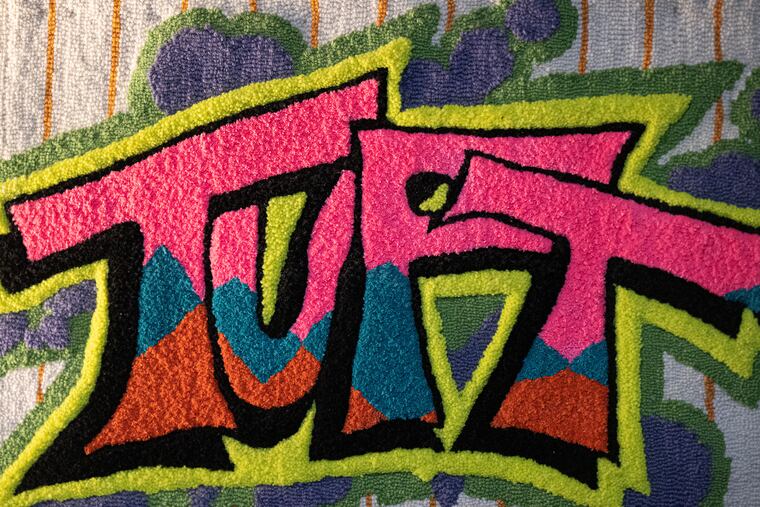A robot is changing the way Philly tufts rugs
Tufting, a century-old rug-making process, has experienced a global revival in recent years. All thanks to a small Philadelphia studio.

In a large, unadorned warehouse in Southwest Philadelphia, a towering machine pierces through the silence for the sake of art. Multicolored spools of wool sit on surrounding shelves, awaiting their turn at getting punched through a cloth as big as 10 feet tall and 13 feet wide. A whirring robot begins this ritual on command, repeating a rhythmic thudding sound for hours as it pulls threads through precise design paths. Hundreds of thuds later, the blank fabric becomes a patterned rug.
Welcome to a regular day at the Tuft the World studio.
Tufting, a century-old rug-making process, has experienced a global revival in recent years, spearheaded in part by this small Philadelphia studio. Founded by local artists Tim Eads and Tiernan Alexander, Tuft the World began selling tufting materials and offering workshops during the pandemic lockdown to make the craft more accessible. It took off, especially on Instagram and TikTok, where artists shared their fluffy creations — from elaborate tufted patterns to pop culture stars like Kirby and SpongeBob.
That surge of popularity made Tuft the World extremely busy as they expanded their shipping to 120 countries. Today that demand has lessened as Amazon and other vendors have started selling more tufting guns and yarn, which Eads says has made his life easier.
“We were the ones who originally brought these products to the market. They were, like, basically impossible to find outside of the carpet industry,” said Eads. “Since then, I would say, [in] the last two years, there’s been a bunch of third-party sellers selling on Amazon directly from China. That’s really caused us to cool down just a bit.”
In this calmer phase, Tuft the World aims to collaborate more with artists to introduce them to tufting — with a special tool that makes the craft more approachable to newcomers and anyone struggling with the painstaking manual process: a computer numerical control (CNC) machine. It is, as Eads calls it, a “game changer.”
Though Eads was a regular tufter himself, he developed carpal tunnel, which limited his tufting ability; enter the $75,000 wonder robot, which can do the work of translating his designs from ideas to a tangible reality.
The “new big robo tufting machine” attracted commercial artist Rachel Breeden, who specializes in graphic design, illustration, and animation. The Delco native who now lives in Lansdowne runs her own design studio called Circa 78. She took a class with Tuft the World and bought a tufting gun, but was still intimidated by the process. When Eads invited Breeden to be an artist in residence, it was the robot that sweetened the deal.
“I saw so many people on Instagram [tufting]. It’s so cool, but it just kept getting [pushed to] the back burner, and it’s not the kind of thing that I could have just picked up in a day and made it look as good as I wanted to,” said Breeden. “I love the design side of things, but I don’t know that I could have gotten the skill for the actual tufting and finishing side of things.”
The robot has now made three of her retro 1970s-inspired designs with bright colors and geometric patterns. Breeden is just one of the many artists who have benefited from Tuft the World collaborations. Last year, groundbreaking textile artist Qualeasha Wood used the machine for a large special-edition rug, To Catch a Predator (2023), depicting an internet user surrounded by big eyes and incoming DM bubbles.
Image files of each work go through carpet design software that makes color blocks and “tool paths” for the machine to follow. Breeden and Eads are still determining where they will sell the rugs; so far they’ve contacted local spots like the vintage shop Jinxed. Eads is in talks with more potential resident artists, from designer Melissa Choi and artist Isaac Lin, the couple behind Philly clothing brand Choilin, to Mz. Icar, the anonymous local collective of mostly Black women who are interdisciplinary artists.
“This is a fairly unique machine, and a lot of artists just don’t have access to something like this,” said Eads. “Life is fairly boring, you know? And I feel like the joy, at least for me, in waking up every day, is really getting to work with people like Rachel, [who] send me designs that they want to bring to fruition.”
Tuft the World, 5400 Grays Ave., Philadelphia, tufttheworld.com